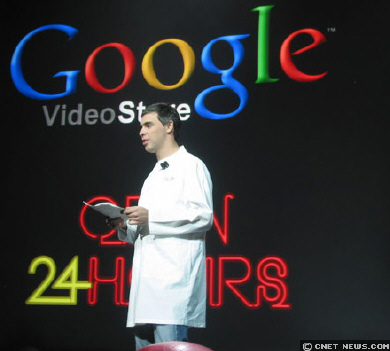Post -CES interviews and analysis of Google Video and Pack


Tristan Louis has an overview, with useful comparison tables, of the current video offerings from all the portals--AOL, Apple, Google, Microsoft and Yahoo. Search Engine Watch has an in-depth analysis of Google Video.
The consummate play-by-play blogger Paul Boutin of Engadget covers the post-CES keynote Google press conference. Some of the more interesting answers in response to reporter questions below:
On the DRM:
Reporters ask about details of DRM deal with CBS. Larry, disinterestedly: "There're a bunch of details about that; I remember some of them, but they're not important. What we've seen with iTunes is that having a pretty good user experience is important ... I think this was a courageous move [for CBS.]"
Google PC:
A reporter at the back blurts out, "What about the Google PC?" [Google CEO Eric] Schmidt huffs in exasperation: "With all due respect, we issued a statement that we have tremendous partners in the PC space, so we have no interest in doing it. I guess some people don't believe it."
Jason Calacanis still thinks that Google has a PC-related play up its sleeve. He speculates that Google will provide a free Google operating systems to hardware vendors--another way to generate ad revenue. Jason says, "Can you imagine if Dell or Compaq could not only sell a computer for $500 with $50 in profit, but also make another $25-50 a year in Adsense revenue? The person keeps the computer for another two years and Dell makes more from the Adsense than the computer."
It's an interesting thought but having to view more ads online on the desktop and in other environs isn't a compelling user proposition. There is some good discussion on his post.
On Google Office:
One reporter asks why no productivity software in Google Pack. Larry: "There's a lot of software like Open Office out there. But we wanted to focus on keeping it simple and making the download work. We didn't think that was the right sort of thing to put in there at first until we'd debugged it."
Nick Carr has a good take on Google Pack and the absence of Google office:
Google wants the initial version of the Pack to be inoffensive because the overriding goal is to get as many Windows users as possible to download it. (If Google stuck Open Office in it, for instance, a lot of users would be nervous, both about the size of the download and about the possibility of screwing up their existing applications.) The Pack is a preemptive strike against Microsoft, which Google knows will use its upcoming updates to Windows, Internet Explorer, and Office to lead users as far away from Google as possible. The Pack will enable Google to get its two desktop search tools - Google Desktop and Google Toolbar - onto more PCs and, in the process, to install a little trojan horse named Google Updater.
Also check out the discussion on Nick's blog post.
On Google Pack as kind of Windows service pack:
"Uhhmmmm, yeah," Larry shrugs. "A lot of people use Windows," he offers regretfully, as if it were his burden in life to fix that.
As I blogged post-keynote, with the mishmash of downloadable software Google is now moving into software provisioning, trying to weave another point of connection with the billions of Internet users. The question is whether it's a trojan horse or a dead horse--whether users will care about downloading a bunch of software tied to a Google update service. If it's a real trojan horse, there has to be a lot more--more than adding openoffice.org or Google X, Y or Z to make Microsoft hurt.